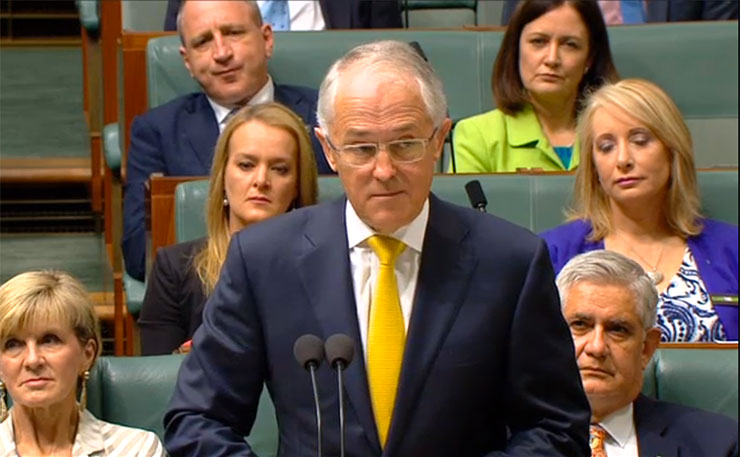The comments are likely to legitimise concerns held by many Aboriginal people that constitutional reform will come at the expense of more powerful legal agreement. Max Chalmers reports.
Malcolm Turnbull has contradicted the government-backed Recognise campaign, claiming the urgency of constitutional reform means the question of a treaty must be put aside.
The comments were made by Turnbull at a press conference in which he criticised Labor leader Bill Shorten for raising the prospect of a treaty on the ABC’s Q&A program last night.
“The path of Constitutional change is a difficult one, as I know from my own experience. It requires bipartisan support and enormous public support,” he said.
Turnbull said such public support existed for constitutional reform, but that beginning to discuss a treaty would put this at risk.
“To introduce another element, a treaty, the terms of which is unknown, the nature of which is unknown, adds a level of uncertainty that puts at risk the constitution recognition process,” he said.
“Mr Shorten should have more discipline, and more focus, on ensuring we maintain support for constitutional recognition rather than introducing other concepts which will, in my view, undermine the prospects of getting the very high levels of public support you need for constitution recognition of our first Australians”.
The comment was intended as a rebuke of the Opposition Leader, but also packs a punch for the government-funded push for constitutional reform, known as the Recognise campaign. The campaign has had to make continual assurances to Aboriginal and Torres Strait Islander people that constitutional reform will not come at the expense of a treaty, seen by many as a more significant step forward.
 Recognise’s FAQ page explicitly contradicts the Prime Minister.
Recognise’s FAQ page explicitly contradicts the Prime Minister.
“Would constitutional recognition negate calls for a treaty/treaties,” it asks.
“No. Let’s be clear on the facts. Calls for a treaty or treaties and constitutional recognition of Aboriginal and Torres Strait Islander peoples are separate aspirations and they can co-exist. Many Aboriginal and Torres Strait Islander people support both.”
Constitutional reform would likely see Australians face a referendum on whether to remove various sections of the constitution that make explicit references to race, while inserting a general statement of recognition for Indigenous people into the document.
A treaty, on the other hand, would be a formal agreement between Indigenous and non-Indigenous Australians, perhaps along the lines of New Zealand’s Treaty of Waitangi.
The Victorian government recently took an historic step towards signing a treaty with First Nations people in the state after a February meeting of black leaders rejected constitutional recognition.
After Turnbull’s attack today, Shorten hit back at the PM.
“There’s a lot of younger Aboriginal and Torres Strait Islander people, a lot of Aboriginal and Torres Strait Islander people who say ‘well, that’s all fine and good Bill, constitutional recognition and reform. But what about the real problems, the other problems we encounter’,” Shorten said.
The Labor leader said he had been taking advice from recently installed Senator and ‘father of reconciliation’ Patrick Dodson “about how we can have a better, post-constitutional reform process, a settlement.”
“Simply pretending that constitution recognition, reform, what have you, on its own, is the answer to all the problems, it isn’t,” Shorten added. “It’s a necessary prerequisite, but it is not the whole solution.”
Donate To New Matilda
New Matilda is a small, independent media outlet. We survive through reader contributions, and never losing a lawsuit. If you got something from this article, giving something back helps us to continue speaking truth to power. Every little bit counts.





